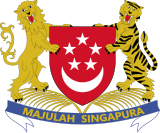
Back Circunscripción de Representación Grupal Spanish Group Representation Constituency French 集団選挙区制 Japanese 집단선거구제 Korean Kawasan Undi Perwakilan Berkumpulan Malay 集选区 Chinese 集選區 ZH-YUE
| This article is part of a series on |
 |
|---|
|
|
A group representation constituency (GRC) is a type of electoral division or constituency in Singapore in which teams of candidates, instead of individual candidates, compete to be elected into Parliament as the Members of Parliament (MPs) for the constituency. Synonymous to the party block voting (PBV) or the general ticket used in other countries, the Government stated that the GRC scheme was primarily implemented to enshrine minority representation in Parliament: at least one of the MPs in a GRC must be a member of the Malay, Indian or another minority community of Singapore. In addition, it was economical for town councils, which manage public housing estates, to handle larger constituencies.
The GRC scheme came into effect on 1 June 1988, and was first introduced at the general election that same year. Prior to that date, all constituencies were Single Member Constituencies (SMCs). The Parliamentary Elections Act (Cap. 218, 2008 Rev. Ed.) ("PEA") states that there must be at least eight SMCs, and the number of MPs to be returned by all GRCs cannot be less than a quarter of the total number of MPs. Within those parameters the total number of SMCs and GRCs in Singapore and their boundaries are not fixed but are decided by the Cabinet, taking into consideration the recommendations of the Electoral Boundaries Review Committee. Per the Constitution and the PEA, there must be between three and six MPs in a GRC. The number of MPs in each GRC is declared by the President at the Cabinet's direction before a general election. For the purposes of the 2020 general election, there were 14 SMCs and 17 GRCs, each returning four or five MPs.
Reception towards to the GRC system is mixed, with some critics disagreeing with the government's justifications for introducing the scheme, noting that the proportion of minority MPs per GRC has rather decreased with the advent of five-member and six-member GRCs, although the latter was not present in the 2020 general election. In addition, the ruling People's Action Party (PAP) has been described as using GRCs as a means of bringing in politically inexperienced candidates into Parliament by "riding on the coattails" of GRCs helmed by senior politicians, including "anchor" ministers. Moreover, the GRC scheme is also said to disadvantage opposition parties because it is more difficult for them to find enough candidates with the political expertise to contest GRCs. Furthermore, it is said that the GRC scheme means that electors may have unequal voting power, weakens the relationship between electors and MPs, and entrenches racialism in Singapore politics due to its emphasis on minority representation.